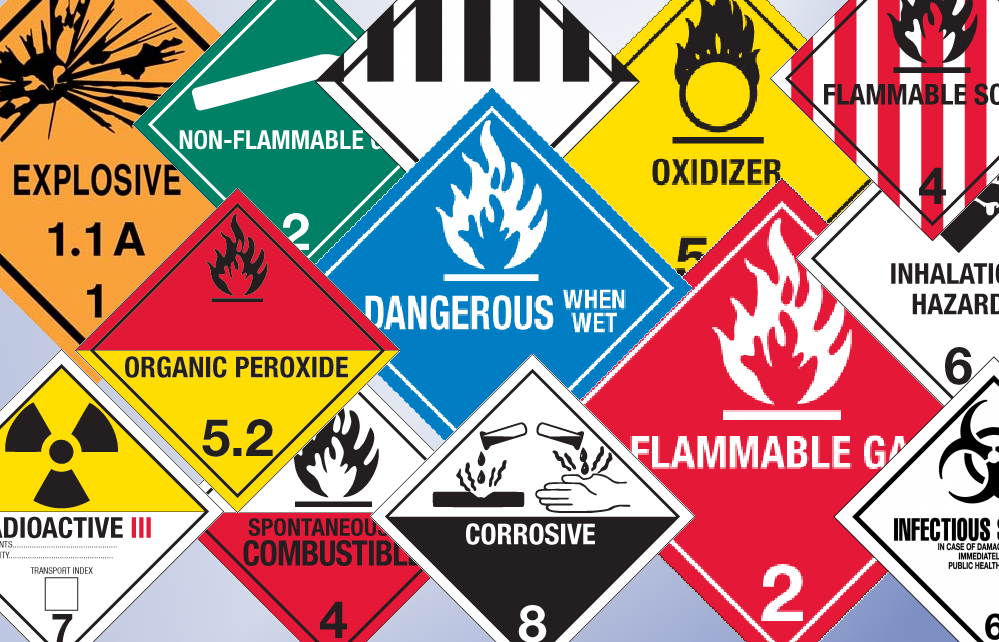
A common question among CDL drivers is when a hazmat endorsement is required. Many drivers seek the endorsement as a means to provide flexibility in the loads they can carry and thus the opportunity to make more money. While the requirement for having a hazmat endorsement on a CDL may seem complicated, it is pretty straightforward: no placard required, no CDL endorsement required.
Knowing when a load needs to be placarded requires some knowledge of the US Hazardous Materials Regulations, but let’s start at the very beginning.
So how do you know if you need a hazmat endorsement on your CDL?
What is a Hazmat Endorsement?
The Federal Motor Carrier Safety Administration (FMCSA) sets forth the requirements for commercial motor vehicles, the companies that own them, and the drivers that operate them. FMCSA defines “an endorsement as an authorization to an individual’s CLP or CDL required to permit the individual to operate certain types of commercial motor vehicles.” Drivers must pass specialized tests to receive the desired endorsement. 49 CFR 383.93(b) requires a knowledge test be taken by anyone that wishes to receive a hazmat endorsement on their CDL.
If you are required to placard the load you are hauling, you must have a hazmat endorsement.
Having a thorough understanding of the Department of Transportation’s placarding rules is critical when you want to obtain an endorsement on your CDL. In fact, it’s equally important if you’re planning to accept a cargo where hazardous materials are in the mix. Unfortunately, the DOT placard rules can be confusing, and they have a lot of exceptions.
The regulations state that a driver must obtain a State-issued endorsement to a CDL to operate a motor vehicle that is used to transport a hazardous material as defined in 49 CFR 383.5. A hazardous material, for the purposes of a hazmat endorsement on a CDL, is defined as “any material that has been designated as hazardous under 49 U.S.C. 5103 and is required to be placarded under subpart F of 49 CFR part 172 or any quantity of a material listed as a select agent or toxin in 42 CFR part 73”.
Not all cargo bearing hazardous materials labels on the packages requires a placard.
Is It Possible to Haul A Hazmat Load Without A Hazmat Endorsement?
Drivers can haul cargo that falls under the definition of a hazardous material even if they don’t have an endorsement.
The general placarding requirements are found in 49 CFR 172.504. The section starts with the statement that any vehicle containing any quantity of hazardous materials must be placarded. Quickly following that statement are several exceptions.
Loads of less than 454 kg (1,001 lbs) of a hazardous material covered by Table 2 in the placarding section are not required to be placarded. Hazard classes listed in Table 2 include:
- Explosives 1.4, 1.5, and 1.6,
- Divisions 2.1 and 2.2,
- Class 3,
- Divisions 4.1 and 4.2,
- Divisions 5.1 and certain 5.2,
- Division 6.1 (other than inhalation hazards) and 6.2,
- Class 8
Further, 49 CFR 172.504(f)(9) states that a class 9 placard is not required for domestic transportation, including that portion of international transportation that occurs within the United States. The Pipeline and Hazardous Materials Safety Administration (PHMSA) recently published a letter of interpretation stating that vehicles with class 9 placards displayed are not required to be operated by drivers with hazmat endorsements.
Finally, packages containing limited quantities of hazardous materials are excepted from the placarding requirements. There is no weight limit on these types of materials.
To summarize, hazmat loads of less than 454 kg (1,001 lbs) of a Table 2 material listed above, Class 9 materials, and materials shipped in limited quantities do not require placards and do not require a driver with a hazmat endorsement to operate the vehicle.
In addition according to the Transportation Security Administration (TSA), your endorsement must be renewed every 5 years along with your fingerprints. But the renewal requirements may vary from state to state.
Is Training Required as part of a Hazmat Endorsement?
49 CFR 172.704 requires each hazmat employee receive general awareness, function-specific, safety, and security training. Drivers of motor vehicles carrying hazardous materials must be familiar with the requirements of the Hazardous Materials Regulations, be able to recognize and identify hazardous materials and be able to perform the functions necessary to safely operate a vehicle containing hazardous materials. These functions include reading a shipping paper, understanding the placarding requirements, being able to protect themselves from exposure to hazardous material, and being aware of the security risks of carrying hazardous materials in the vehicle.
49 CFR 177.816 further requires drivers receive training specific to the operations of the motor vehicle as required by 49 CFR 390 through 397. This training must include compatibility and segregation of cargo in a mixed load, package handling methods, and load securement.
Improve Your 49 CFR Knowledge With Hazmat University
Hazmat University provides online hazmat training for individuals and organizations that handle and transport hazardous materials and dangerous goods. Whether you are a shipper, a freight forwarder, or you work for one, our specially-designed hazmat courses will help you perform your jobs safely and effectively. If you have any questions or you want to see an Interactive Demo, call us at (844) 532-7634 or (609) 860-0300. You can also reach us online.